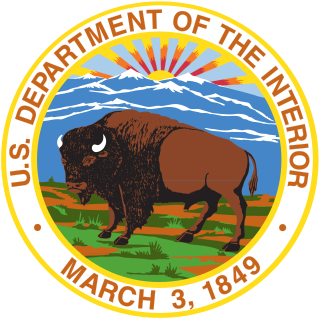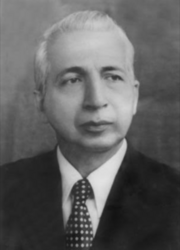
The United States Department of the Interior (DOI) is a federal executive department of the U.S. government. It is responsible for the management and conservation of most federal lands and natural resources, and the administration of programs relating to Native Americans, Alaska Natives, Native Hawaiians, territorial affairs, and insular areas of the United States. About 75% of federal public land is managed by the department, with most of the remainder managed by the United States Department of Agriculture's United States Forest Service.

The Government of the Hong Kong Special Administrative Region of the People's Republic of China, commonly referred to as the Hong Kong Government or HKSAR Government, refers to the executive authorities of Hong Kong SAR. It was formed in July 1997 in accordance with the Sino-British Joint Declaration, an international treaty in force and lodged at the United Nations. This government replaced the former British Hong Kong Government (1842-1997). The HKSAR Government is led by the Chief Executive, who nominates its principal officials for appointment by the State Council of the People's Republic of China.
The African Commission on Human and Peoples' Rights (ACHPR) is a quasi-judicial body tasked with promoting and protecting human rights and collective (peoples') rights throughout the African continent as well as interpreting the African Charter on Human and Peoples' Rights and considering individual complaints of violations of the Charter. This includes investigating human rights violations, creating and approving programs of action towards encouraging human rights, and set up effect communication between them and states to get first hand information on violations of human rights. Although the ACHPR is under a regional government facility, they don't have any actual power and enforcement over laws. This ends up in them drafting up proposals to send up the chain of command to the Assembly of Heads of State and Government and they will act accordingly.

The Executive and Legislative branches operate primarily at the national level, although various ministries in the executive branch also carry out local functions. Local governments are semi-autonomous and contain executive and legislative bodies of their own. The judicial branch operates at both the national and local levels. The South Korean government's structure is determined by the Constitution of the Republic of Korea. This document has been revised several times since its first promulgation in 1948. However, it has retained many broad characteristics; with the exception of the short-lived Second Republic of South Korea, the country has always had a presidential system with a relatively independent chief executive.

The government of the U.S. State of Oklahoma, established by the Oklahoma Constitution, is a republican democracy modeled after the federal government of the United States. The state government has three branches: the executive, legislative, and judicial. Through a system of separation of powers or "checks and balances," each of these branches has some authority to act on its own, some authority to regulate the other two branches, and has some of its own authority, in turn, regulated by the other branches.
Executive Schedule is the system of salaries given to the highest-ranked appointed officials in the executive branch of the U.S. government. The President of the United States appoints individuals to these positions, most with the advice and consent of the United States Senate. They include members of the president's Cabinet, several top-ranking officials of each executive department, the directors of some of the more prominent departmental and independent agencies, and several members of the Executive Office of the President.

Thomas Edward Perez is an American politician and attorney who has been the Chair of the Democratic National Committee since February 2017. Perez was previously Assistant Attorney General for Civil Rights (2009–2013) and United States Secretary of Labor (2013–2017).
Seada Palavrić is a Bosnian lawyer, politician, and judge of the Constitutional Court of Bosnia and Herzegovina.

The Presidential Secretariat is the office of the President of Sri Lanka. It provides the administrative and institutional framework for the exercise of the duties, responsibilities and powers vested in the President by the Constitution. The Presidential Secretariat is located in the Old Parliament Building in Colombo.

Ranganath Misra was as the 21st Chief Justice of India, serving from 25 September 1990 to 24 November 1991. He was also the first chairman of the National Human Rights Commission of India. He also served as Member of Parliament in Rajya Sabha from the Congress Party between 1998-2004.
Raja Lakhamgouda Law College is an institution for legal education situated in Belgaum, Karnataka, India. It was established in 1939 by the Karnataka Law Society, and is one of the oldest Indian Law Colleges. The college is named after Raja Lakhamgouda Sirdesai, the head of the former princely state of Vantamuri who has served as a mentor and donor to the school. During the seven decades of its existence, a good number of past students have emerged as eminent lawyers, with most occupying high posts in the judiciary, legislature and executive. The law college is reported as having excellent faculty.

The National Election Commission is the independent electoral branch in South Korea established to manage free and fair elections and national referendums and administrative affairs concerning political parties and funds. The agency was established in accordance with Article 114 of the Constitution of South Korea. The NEC is equal in status with the National Assembly, the executive branch, the Supreme Court and the Constitutional Court of Korea. The purpose of its establishment is to fairly manage elections.
The Order of Precedence in the Philippines is the protocol used in ranking government officials and other personages in the Philippines. Purely ceremonial in nature, it has no legal standing, and does not reflect the presidential line of succession nor the equal status of the three branches of government established in the 1987 Constitution.
The Goa Human Rights Commission was constituted in the month of March 2011 to perform the functions assigned to the State Commission under Chapter V of the Protection of Human Rights Act 1993. The current Chairman of the Commission is A. D. Salkar, retired District Judge.
The Constitutional Council (CC) is a 10-member constitutional authority in Sri Lanka tasked with maintaining independent commissions and monitoring its affairs. The Constitutional Council is aimed at depoliticizing the public service.
Chhattisgarh Human Rights Commission become functional on 16 April 2001 with appointment of first Chairperson, Justice K. M. Agrawal, a former Chief Justice of Sikkim High Court and Shri K. A. Jacob, former D. G. P. of Bihar as the founder members by Notification No. 4139/GAD/2001 with effect from the date they assumed charge of the office.
Odisha Human Rights commission was constituted on 27 January 2000 via home department notification No. 5144 Dt: 27.8.2000. However, it became formally operational on 11 July 2003 with the appointment of Justice D. P. Mohapatra, a former Chief Justice of the Allahabad High Court and former Judge of the Supreme Court of India joined as its first chairperson of the commission via notification No. 8438 Dt: 24.6.2003. He was supported by Shri S.M. Patnaik, a former Chief Secretary to Government of Orissa via notification No.8441 Dt: 24.6.2003.
The 1911 Delhi Durbar was held in December 1911 following the coronation in London in June of that year of King George V and Queen Mary. The King and Queen travelled to Delhi for the Durbar. For the occasion, the statutory limits of the membership of the Order of the Star of India and the Order of the Indian Empire were increased and many appointments were made to these and other orders. These honours were published in a supplement to the London Gazette dated 8 December 1911.









